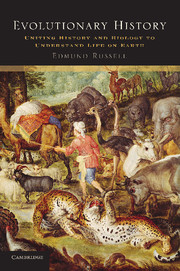Book contents
- Frontmatter
- Contents
- Figures
- Tables
- Preface
- Acknowledgments
- 1 Matters of Life and Death
- 2 Evolution's Visible Hands
- 3 Hunting and Fishing
- 4 Eradication
- 5 Altering Environments
- 6 Evolution Revolution
- 7 Intentional Evolution
- 8 Coevolution
- 9 Evolution of the Industrial Revolution
- 10 History of Technology
- 11 Environmental History
- 12 Conclusion
- Note on Sources
- Glossary
- Notes
- Index
1 - Matters of Life and Death
Published online by Cambridge University Press: 05 June 2012
- Frontmatter
- Contents
- Figures
- Tables
- Preface
- Acknowledgments
- 1 Matters of Life and Death
- 2 Evolution's Visible Hands
- 3 Hunting and Fishing
- 4 Eradication
- 5 Altering Environments
- 6 Evolution Revolution
- 7 Intentional Evolution
- 8 Coevolution
- 9 Evolution of the Industrial Revolution
- 10 History of Technology
- 11 Environmental History
- 12 Conclusion
- Note on Sources
- Glossary
- Notes
- Index
Summary
When I was thirteen, my grandfather died of a heart attack. He had entered the hospital for treatment of a prostate problem. Once there, he picked up an infection that led to heart failure. His death saddened me, of course, but it also puzzled me. I had seen wonder drugs such as penicillin cure ailments plaguing members of my family, so I could not understand why similar drugs would not have controlled my grandfather's infection. It seemed especially odd that he died in a hospital, where he should have benefited from the best treatment available. But the shelf of memory devoted to unsolved mysteries is long and dark, and I stored my grandfather's death there for decades.
Recently, I realized that a potential solution to the puzzle glowed on the computer screen in front of me. My grandfather's death might have been an example of this book's argument: people have encouraged evolution in populations of other species, which in turn has shaped human experience. I had known for decades that pathogens evolved resistance to antibiotics, but I had never applied that idea to the death of a loved one. The realization sent my heart racing and my fingers trembling so much I could not type for an hour.
Here is what might have happened. Before my grandfather arrived, doctors at a hospital in Omaha used a certain antibiotic (such as penicillin or a newer drug) after surgery to prevent and treat infections. It worked effectively.
- Type
- Chapter
- Information
- Evolutionary HistoryUniting History and Biology to Understand Life on Earth, pp. 1 - 5Publisher: Cambridge University PressPrint publication year: 2011



